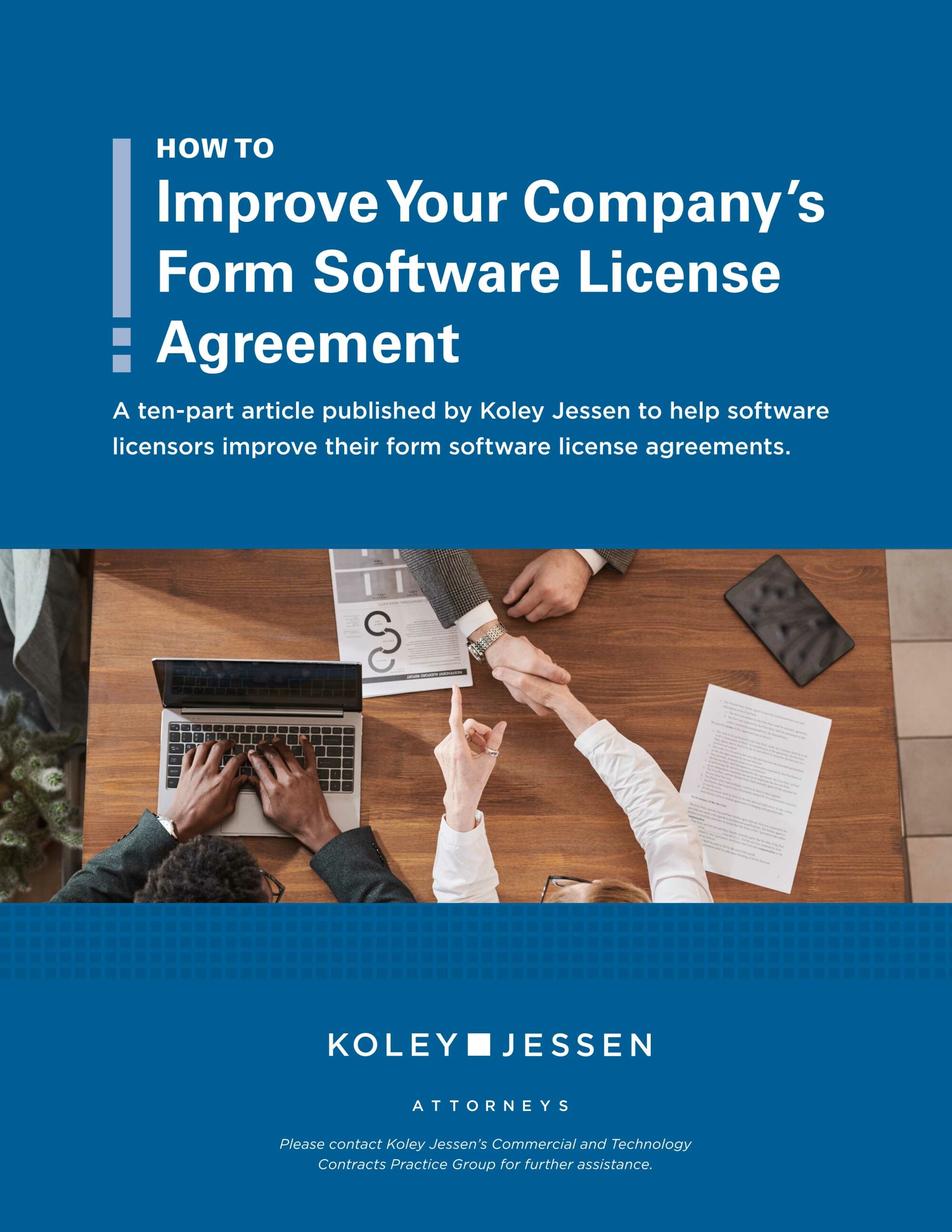How to Improve Your Company’s Form Software License Agreement — A 10 Part Series
When developing or updating your form on-premise software license agreement, there are several things that should be taken into consideration. To provide an overview of these critical considerations from a software licensor's perspective, our team of software lawyers specializing in Commercial and Technology Contracts has authored a ten-part article series. This series serves as a valuable resource for licensees as well, offering insights into understanding licensors' form agreements.
Want the latest publications delivered straight to your inbox? Ensure you are on our Commercial and Technology mailing list. Simply fill out this form or email us at info@koleyjessen.com to subscribe.

A full PDF version of this article series
is also available.
Part 1: Limitation of Liability
Even if a licensor breaks one of its contractual promises, it is customary and “market” for a licensor to disclaim certain types of damages and to limit its aggregate liability under the software license agreement. The primary rationale behind these provisions is that no one commercial contract is worth “betting the company” by exposing the licensor to unlimited liability.
Part 2: Assignment
Assignment provisions govern a party’s ability to transfer some or all of its rights, obligations, and liabilities under a contract to a third party. As a general rule, if the contract does not include an assignment provision or otherwise address a party’s right to assign the contract, default law permits a party to assign the contract to a third party without the consent of the other contracting party.
Part 3: Indemnification
Indemnification is one of the most challenging concepts to understand in software license agreements for business teams and young attorneys alike. An indemnification obligation can be a very expensive obligation as well, if triggered. As a result, the indemnification provision is probably the most negotiated provision in software license agreements.
Part 4: Representations & Warranties
For purposes of this article, we will treat representations and warranties synonymously and refer to them collectively as “warranties.” In essence, a warranty is a statement of a past, present, or future fact or condition with a guarantee that such past, present, or future fact or condition remains true for a certain period of time. Warranties are distinct from contractual obligations or covenants that are promises to do, or refrain from doing, certain acts in the future. A party to a contract may be liable to the other party for various damages and remedies if a warranty it provides is or becomes untrue.
Part 5: Maintenance and Support
In the software licensing context, “maintenance” typically refers to the licensor’s obligations to provide software updates, upgrades, releases, bug fixes and patches; and “support” typically refers to the licensor’s obligations to provide technical support (ex. telephone help desk). If the licensor intends to offer maintenance and support services under a separate agreement than the form software license agreement, the form software license agreement should expressly say so.
Part 6: Boilerplate
While many businesses and their attorneys spend the majority of their time and effort on the most material provisions of a software license agreement (license grant, payment terms, limitation of liability, indemnity, etc.), often times disputes (and your likelihood of success therein) will be significantly impacted by the less negotiated terms. A prime example of this is what attorneys call the “boilerplate” provisions of a contract. These are typically found at the end of the contract, often times labeled as “Miscellaneous”, and rarely do businesses and attorneys give these provisions the attention they deserve.
Part 7: License Grant
The license grant is the core provision of a software license agreement. This article focuses on end user license grants that permit the customer to use the software for its own internal business operations, as opposed to reseller or distributor license grants or license grants that permit the customer to use the software to provide services to its customers.
Part 8: Price and Payment Terms
When licensing software, customers typically pay for: (1) the license to use the software, and (2) various professional services associated with the license to use the software. In most cases, payment of fees by the customer is the central benefit of the bargain for the licensor. Accordingly, the price and payment terms of the agreement are critical for the licensor.
Part 9: Intellectual Property
Software license agreements often contain default provisions that set forth basic rules for ownership of IP. These provisions typically provide that (1) each party will retain ownership of their own pre-existing IP, (2) each party will own the IP in what they develop, and (3) licensor will retain ownership of all IP in the licensed software. As is often the case, default provisions that are not carefully drafted often create unintended issues.
Part 10: Remedies
Put simply, remedies are the rights that are available to a contracting party as a result of the other party’s breach of contract, breach of warranty, or misrepresentation. Remedies are critical for all contracting parties because they answer the following question: “What does my client or company actually get as a result of the other party’s breach?”
Interested in diving deeper? Our software attorneys, David Goeschel and Jack Horgan, have also led a comprehensive two-part webinar series. The series explores key strategies and best practices for drafting and negotiating software license agreements, equipping you to effectively safeguard your company's interests while fostering positive business relationships. Now available on-demand, you can watch Part 1 here and Part 2 here to gain valuable insights, practical examples, and guidance on various contract provisions.
This content is made available for educational purposes only and to give you general information and a general understanding of the law, not to provide specific legal advice. By using this content, you understand there is no attorney-client relationship between you and the publisher. The content should not be used as a substitute for competent legal advice from a licensed professional attorney in your state.

